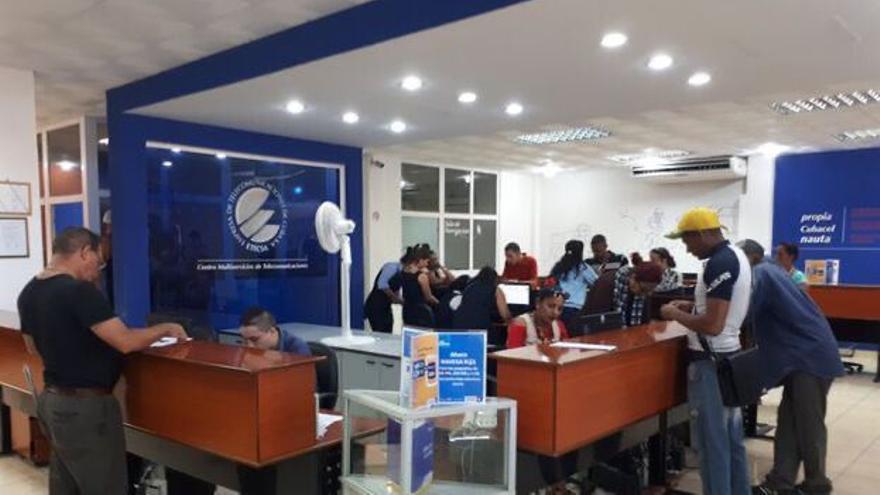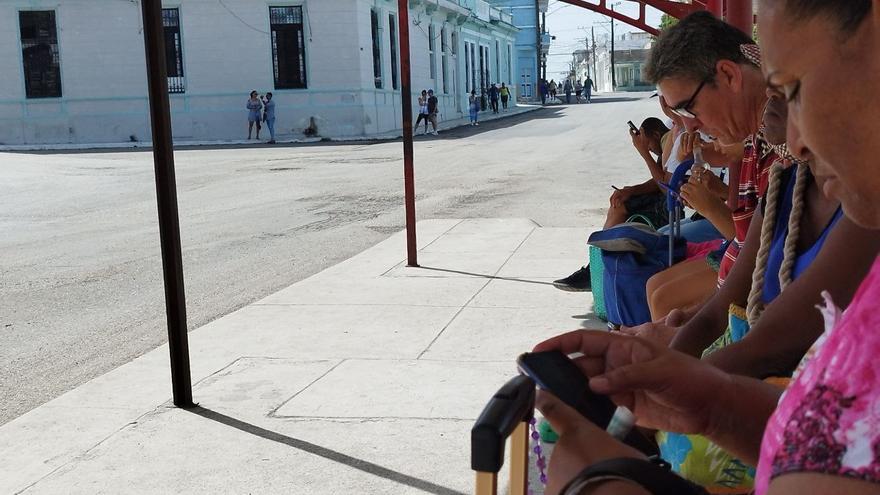
- The monopoly’s revenues have plummeted from $807 million in 2020 to $128 million in 2022
![]() 14ymedio, Havana, 24 August 2023 — The poor quality of international telecommunication connections in Cuba is an ongoing source of customer frustration. What no one suspected until recently is that this is a deliberate strategy by the state telephone monopoly Etecsa to recoup the income it has lost to free internet calls.
14ymedio, Havana, 24 August 2023 — The poor quality of international telecommunication connections in Cuba is an ongoing source of customer frustration. What no one suspected until recently is that this is a deliberate strategy by the state telephone monopoly Etecsa to recoup the income it has lost to free internet calls.
Once seen as the hen that laid the golden egg, Etecsa is now on the verge of bankruptcy. According to the National Office of Statistics and Information (ONEI), telecommunications, transmission and information supply services generated just 128 million dollars in 2022, a spectacular drop compared to the 807 million it generated two years earlier.
To get out of the financial hole that the internet and currency unification — the so-called ’Ordering Task’* — has gotten it into, Etecsa wants to force its customers to pay up, says Raudel García Bringas, a telecommunications expert who spent three years in a Cuban jail for his professional activities. The problem, he claims, is that Etecsa is the result of a flawed state-centered economic model. “Charging for its services in a highly devalued currency, like the Cuban peso, when it must pay for everything it buys in hard currency is a road to disaster,” he explains.
If the company wants to return to profitability, he adds, it will have to “dollarize” its services
If the company wants to return to profitability, he adds, it will have to “dollarize” its services. “[But then] it will be stuck with the problem of billing customers in a currency in which they do not get paid and which makes life more expensive for a population with very little purchasing power.”
“To top it all off,” he continues, “selling data packages created a more serious, though unavoidable, problem.” Once platforms such as WhatsApp and Messenger began offering telecommunication services over the internet, the market for international calls dried up. In Cuba, where the cost of a one-minute international call is prohibitively expensive, these apps meant huge losses for Etecsa. “Those who thought mobile phone recharging fees would make up for lost income from international calls were wrong,” he says.

As a kind of countermeasure, the company has tried to sabotage internet-based telecommunication by altering the quality of calls, García claims. “The inability to get online and constantly having to reconnect often makes communication difficult.”
“If Etecsa manages to restrict communication through channels such as WhatsApp and Messenger, or limits the use of VPNs (Virtual Private Networks — applications that alter the geolocation of a phone and allow access to blocked pages), then it will force people who have become accustomed to communicating daily with their relatives to switch to traditional long-distance telephone calls,” he says.
Customer complaints about poor internet connectivity continue to plague the company. Katia, a 47-year-old Havana resident currently on a shopping trip to Panama, has been trying unsuccessfully for a week to communicate with her husband back home. “The problem is in Cuba. I have no trouble talking to to my sister in Miami from here or to my nieces who live in Spain. We can even have video conferences.” she says.
The company’s mismanagement and its falling earnings have also affected its workers. José Luis, an employee from Camagüey who has been with Etecsa for over a decade, recalls when he first started with the company: “It was a different place. The afternoon snacks were really good, there was air conditioning in all the offices and we had good computers to work with,” he says.
In addition to their salary, employees also receive an “incentive” of 4,000 to 7,000 pesos a month and a small package or two of coffee every three months
Liudmila, a resident of Villa Clara who has been with the company for twenty years, was also there during its golden age. “I remember them giving us a very good personal hygiene package. It had bath and laundry soap, shampoo, perfumes, deodorant, toilet paper, sanitary pads and detergent. At some point that all ended but, since the company was doing well, they began paying us bonuses of 10, 20, even 35 convertible pesos depending on your position in the company.”
In addition to their salary, employees also receive an “incentive” of 4,000 to 7,000 pesos a month and a small package or two of coffee every three months.
Both workers agree, however, that the company is no longer what it used to be. “Now we don’t even have the cables to make a repair when a landline customer calls to report a break,” says Jose Luis.

“Customers are also always coming to our branches very upset, of course, because they’ve bought data packages with extras but they can barely get online,” she explains. “We are not providing a good service, and the employees know it, but most people here just go along with the bosses until they can find something better or until their parole** arrives in the mail.”
Further aggravating Etecsa’s efforts to generate income is the number of people who have decided to emigrate. The mobile phone recharging fees emigrants pay to communicate with family members have not been as lucrative as the company had anticipated. The island’s population has been in decline. And the fact that many of Etecsa’s customers are young people, who also happen to be the age group most likely to emigrate, means the size of its clientele has shrunk considerably.
Etecsa claims it has seven million mobile phone customers but it has never specified if this figure refers to the number of SIM cards it has sold or to actual active users.
“I use the Telegram app for messaging and it alerts me when a number I have in my contacts opens a social network account,” says Osmani. “Lately, I’ve had a lot of scares because I’ve been notified about people who I know don’t live in Cuba anymore or who died during Covid. Etecsa is obviously selling our phone numbers again.”
“Telephone companies all over the world do this,” he notes, “but what strikes me is the number of people who have left the country and that Telegram notifies me that their number is being used again. Rather than growing the size of its customer base, it’s filling the gaps left by those who’ve emigrated.”
Translator’s notes:
*The “Ordering Task” [Tarea Ordenamiento] is a collection of measures that include eliminating the Cuban Convertible Peso (CUC), leaving the Cuban peso as the only national currency, raising prices, raising salaries (but not as much as prices), opening stores that take payment only in hard currency which must be in the form of specially issued pre-paid debit cards, and a broad range of other measures targeted to different elements of the Cuban economy.
**The Cuban Family Reunification Parole Program allows certain eligible U.S. citizens and lawful permanent residents to apply for parole for their family members in Cuba. If granted parole, these family members may come to the United States without waiting for their immigrant visas to become available.
____________
COLLABORATE WITH OUR WORK: The 14ymedio team is committed to practicing serious journalism that reflects Cuba’s reality in all its depth. Thank you for joining us on this long journey. We invite you to continue supporting us by becoming a member of 14ymedio now. Together we can continue transforming journalism in Cuba.
